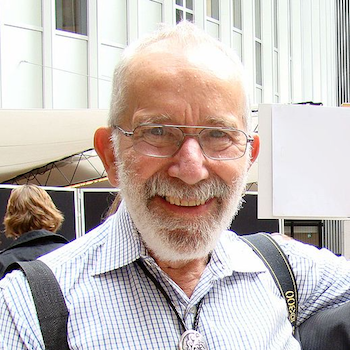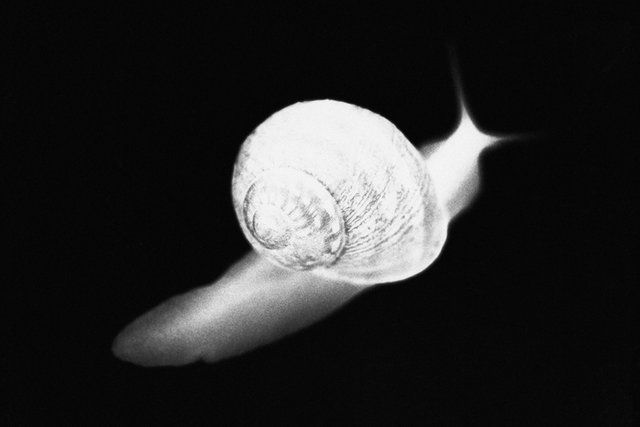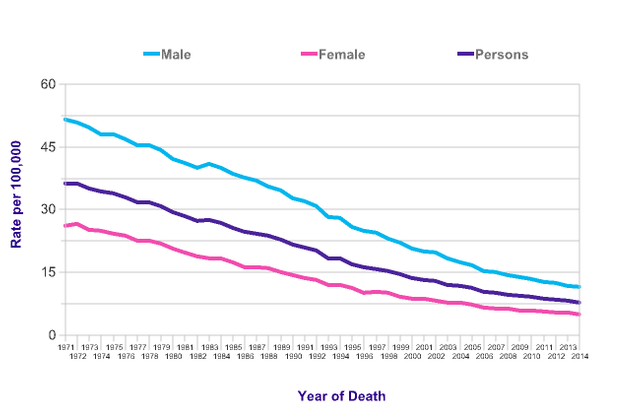Mavericks in Science: - Progress Can Mean Standing Up to Dogma (Part 1: Marshall and Warren)
Introduction

I'm looking to do a few posts discussing some of the "mavericks" who have gone against the scientific grain and succeeded in pushing progress forward through their endeavours despite the odds being stacked against them.
Just for sake of definition let's look at how Merriam-Webster defines a "maverick":
: a person who refuses to follow the customs or rules of a group
These are people who stand out from the crowd just like the pink flamingo in the image above.
The first mavericks I will discuss are the duo of Barry Marshall and Robin Warren. I will try to be brief because I think the length of my posts puts people off!
For those who can get to the end there is a kitten photo as a reward.
Who are Marshall and Warren?

The Short Answer:
They are the 2005 winners of the Noble Prize in Physiology/Medicine according to the official Nobel web page:
"for their discovery of the bacterium Helicobacter pylori and its role in gastritis and peptic ulcer disease"
The Longer Answer:


The Royal Perth Hospital and An Interesting Finding
Barry Marshall (left image) became a medical registrar (middle grade doctor) at the Royal Perth Hospital in Australia in 1979 where Robin Warren (right image) was a pathologist at the time.
The pair shared an interest in gastritis (inflammation of the stomach lining) and related conditions such as gastric ulcers and their relationship with the presence of spiral bacteria called helicobacter.
As a pathologist Warren had witnessed the presence of these bacteria not just in gatritis and ulcers but also in gastric cancers.
Stress Causes Ulcers Not Bacteria Everyone Knows That
The medical thinking at the time was that things like ulcers and gastritis were caused purely by stress.
The only treatments for these conditions were a combination of stress reduction and symptomatic treatment (e.g. antacids or acid suppressing drugs).
The basic principle behind the thinking was this:
The human stomach produces very strong hydrochloric acid it also contains various enzymes for helping to break down food. The combination of these two types of agents is highly corrosive and can easily eat through normal tissue.
This ironically includes the lining of the stomach itself. The solution to this problem is that the stomach produces a layer of mucus which creates a barrier against the acid.
Stress was known to slow down production of mucus. There were also rather gruesome experiments where "stressing" rats was shown to induce ulcers.
Hence it was reasoned that too much stress resulted in insufficient mucus production as well as an increase in acid.
This created gaps in the protective layer which allowed the acid through where it could burn through the stomach tissue and create an ulcer.
If stress continued to occur the ulcer could then be burned further and further until the stomach lining was breached and the acid started to attack the area outside the stomach including surrounding arteries.
These were common conditions (affecting up to one in 10 people) and presented a significant risk through complications (such as massive GI bleeds due to the large number of arteries in close proximity to the stomach).
In severe cases some patients even underwent radical surgery such as gastrectomy (removal of the stomach) due to the risks. A severe GI bleed could potentially kill a person in minutes.
Although both Marshall and Warren believed that stress may have been a contributory factor in the disease process they felt that it wasn't the complete story and their consistent findings of the presence of h. pylori had something to do with it.
If their hyposthesis was correct then these conditions could potentially be treated and cured by treatment with antibiotics.
The Problem with H. Pylori
The problem with h. pylori is that it only grows in primates and does not infect rats, mice and other animals which are commonly used for preliminary research.
The medical dogma at the time was so strong that without any interventional studies nobody would believe the pair's observational findings.
It was simply believed that the stress hypothesis was entirely correct and that the findings of h. pylori were an artefact of the acid neutralising treatments.
It was believed (without any actual testing) that no bacteria could possibly survive in the acidic conditions of a normally functioning stomach.
Self Experimentation
Out of sheer frustration Marshall did what other mavericks have done in the past and experimented on himself.
After having his stomach examined via endsocopy (a camera) and having samples taken to confirm that he was free of ulcers and h.pylori infection, he infected himself by drinking a cultured broth of the bacteria. Within days he developed symptoms of gastritis.
Follow up examination of his stomach revealed he was infected with the bacteria.
Treatment with antibiotics destroyed the bacteria and cured him of all his symptoms.
This should have been a breakthrough that at the very least lead to further research and at least interest from the medical community.
The Problem with Dogma
Unfortunately it didn't.
Whilst many microbiologists were open to the theory the vast majority of gastroenterologists rejected it outright.
They already knew what caused ulcers and so the idea of bacteria being involved was "obviously" nonsense.
Both Marshall and Warren spent most of the 1980s trying to get other doctors to listen to them and receive funding for further research.
This article from Discover magazine with Warren covers some of their struggles in more detail and I would recommend reading it.
Whilst thousands of papers kept being published on treating ulcers with antacids anything relating to h. pylori would consistently get rejected or ignored.
Slow Progress
The team did eventually get a paper published in The Medical Journal of Australia but still change was very slow. The general medical consensus did not shift.
In the meantime, Marshall had moved and was working in the US.
He had previously received some support from Procter and Gamble the producers of Petpto-Bismal an antacid which also seemed to have an effect on h. pylori infection and this effect seemed to be related to it containing bismuth and not the acid fighting abilities.
It turned out that this association helped to turn the tide as P&G were able to get the pair's story out to publications such as Reader's Digest and The National Enquirer.
I remember reading the Reader's Digest article myself as a child and being inspired by it.
As time went on the consensus shifted and more and more doctors and scientists started to accept the theory and the body of research continued to build.
This reached it's maximum momentum in the early 1990s.
Vindication
In February 1994 the US NIH (National Institute of Health) released a consensus paper on H. Pylori entitled "Helicobacter Pylori in Peptic Ulcer Disease".
This basically confirmed the relationship between the two conditions and asked for further research in patients who were symptomatic (and without ulcers) and the relationship with cancers.
The general rule nowadays is to treat anyone who is found to be infected due to the risk of potential future disease including cancer.
The diagram above shows the actual mechanism as it is understood now.
The h. pylori bacteria break down the protective mucus which results in damage to the stomach lining from acid creating inflammation.
This inflammation can progress onto an ulcer with the potential for bleeding or alternatively cancer as a result of chronic inflammation.
Over a decade later in 2005 both Marshall and Warren received their Nobel prizes.
They have both become celebrated for sticking to their principles despite the skepticism of the rest of the medical community.
If they hadn't stuck with their findings then we might still have people continuing to die from an entirely treatable condition.
Today most cases of gatritis and ulcer are treated and cured and there has been significant reduction in the amounts of gastric cancer since the 1970s as illustrated by the stomach cancer mortality graph below.
Whilst this isn't all down to Marshall and Warren's findings (reduced smoking and other factors also likely have a strong role) they do probably have some hand in this.
Stomach Cancer (C16), European Age-Standardised Mortality Rates, UK, 1971-2014 (from Cancer Research UK)
So Why Did it Take So Long For the Medical/Scientific Community to Change Their Minds?
Human beings are strange creatures.
We are shaped and driven by our emotions and we cling on to our beliefs very tightly.
Whilst in the scientific community we may like to think of ourselves as being above this we can see many examples where people have been ridiculed and derided for questioning things which have become the established "dogma" in a particular field.
According to Merriam-Webster dogma is:
: a belief or set of beliefs that is accepted by the members of a group without being questioned or doubted
: a belief or set of beliefs that is taught by a religious organisation
Some theories in science can take on both these elements of dogma.
Certain theories become established to the point of becoming unquestionable and for some proponents they become tenets of a near religious belief. Further as these theories become incorporated into the reasoning of institutions they create a form of "groupthink" which actively rejects any evidence or hypotheses which contradict them.
For some people refuatation of a theory that they may have based their entire careers on is considered a personal insult.
To preserve their egos and resolve their dissonance they simply reject anything that does this.
These are not deficiencies of science itself but examples of the flaws in the nature of human thinking.
Though we try to engage in being scientific it is hard to escape our need for certainty and our "faith" in certain beliefs.
Ideas which threaten this can be considered dangerous and those who are brave enough to stand up to the establishment risk ridicule and potential ostracisation.
Who knows how many careers have been ruined because someone dared to think the unthinkable?
How much progress has been hindered because scientists were intimidated or forced to give up on their research because they didn't have the financial or mental resilience to keep fighting?
Conclusions
These are important questions to ask and consider.
Science is important in our lives - indeed our lives depend on certain forms of it. It should never become a set of religious beliefs though.
A true scientist knows that science is a process of constant iteration and refinement.
New theories can challenge old ones and in the end the evidence should prevail irrespective of whose feelings or vested interests get hurt as a result.
One's emotions should never get in the way of new findings.
This is particularly relevant in medical science where the stakes can be as high as people losing their lives as a result of inadequate or misguided treatments.
If you have any suggestions for "mavericks" that you would like me to cover in future articles please let me know. Feel free to have your say in the comments.
Thank you for reading. I have tried to strike the right balance between brevity and depth. I hope I have succeeded.
As always I will apologise for any typos or mistakes in advance.
Here is Your Kitten Picture as a Reward for Getting to the End!
If you like my work please follow me and check out my previous posts on science, photography and a variety of other topics @thecryptofiend - hope you enjoy.
Image credits: All images are from my personal Thinkstock account or otherwise locally referenced and linked. Images of Marshall and Warren are both public domain and taken from Wikipedia.
Some of my Recent Posts:
- From Believer to Atheist (My personal journey and my problems with organised religion)
- Why Banning Drugs Doesn't Work (with illustrations by @klye)
- What Happened to Individual Agency/Autonomy? TCM, Chemotherapy and Vaccination.
- The Health Benefits of Coffee
- Rachelle Polaroid Portrait Photos Part 2 - My Own Work
- Closeup Portraits of Rachelle: Photography - My Own Work










The science of today is the technology of tomorrow.
Thanks for your comment. That is true or perhaps to modify it slightly " the theoretical science of today is the technology of tomorrow."
Fore example most people would think that Einstein's theory of general relativity is something very specialised which does not come into our daily lives. That would have been true when it was formulated but today it is used everyday in the calculations necessary for GPS which we all use and rely on.
The hard hitting science was excellent... but then I forgot everything I read after seeing the cute kittens.

Lol. Thank you. It is an honour to have your support:)
Excellent work, congratulations, thanks for the info
You're welcome. Glad you like it:)
Love this article. :-) sometimes, there are scientists with a lot of foresight suggested ideas but are shot down by conservative scientists, hence hindering progress. Politics should not be in play in science but sadly when reputation is involved,... and cute kitty
Thank you. Yes it is true. When you have people you have politics and egos.
I would like to additionally point that there also are non-mainstream ideas refuted on the basis of scientific arguments. Those Maverick people (I didn't know the term before your post, thanks for that) then often use conspiracy theory arguments and ad hominem attacks against well-known scientists to continue defending their ideas at all costs.
I am not saying that non mainstream topics are all like that, but one can find many.
Thank you for your intelligent response.
True but I'm not talking about that. I'm talking about ideas that are based on scientific evidence but the evidence is too inconvenient to be considered.
Many people start with the assumption that they must be right.
Of course and I'm not saying we should not be skeptical about new ideas but we should always be open to looking at the evidence.
Then we agree :)
This is an excellent article. It is too bad that people are so slow to open themselves up to new evidence. They don't want to change their belief systems, so they fight new evidence every step of the way ... until it is too obvious to reject it any longer. Kudos to the scientists who keep at it despite the ridicule or simply being ignored.
Thanks. Yes I would agree.